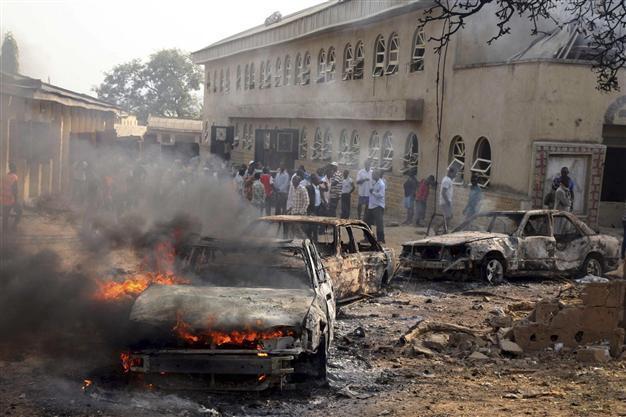'Hundreds dead' in Boko Haram village rampage
MAIDUGURI, Nigeria - Agence France-Presse

A car burns at the scene of a bomb explosion that the Islamist militant group Boko Haram claimed responsibility for at St. Theresa Catholic Church in this file photo.
Hundreds of people are feared dead in a suspected Boko Haram attack on four villages in northeast Nigeria, in the latest upsurge in violence claiming increasing numbers of civilian lives.
Some community leaders put the death toll from the Tuesday attacks in the Gwoza district of Borno state as high as 400 to 500, although there was no independent verification because of poor communications in the remote area.
If confirmed, the attacks in the villages of Goshe, Attagara, Agapalwa and Aganjara would be among the deadliest in the Islamists' five-year insurgency and top the more than 300 who were killed on May 5 in nearby Gamboru Ngala.
"The killings are massive but nobody can give a toll for now because nobody has been able to go to that place because the insurgents are still there. They have taken over the whole area," lawmaker Peter Biye told AFP.
"There are bodies littered over the whole area and people have fled," added Biye, who represents Gwoza in Nigeria's lower chamber of parliament, the House of Representatives.
Boko Haram's bloody reign of terror in northeast Nigeria is forcing 800 people to flee from their homes every day and has claimed more than 3,000 lives in the past year, the Geneva-based Internal Displacement Monitoring Centre (IDMC) said.
Another 45 people were killed when suspected Boko Haram gunmen pretending to be itinerant preachers opened fire on a crowd in the village of Barderi near the Borno state capital, Maiduguri, on Wednesday evening.
One survivor, Mallam Bunu, said: "They... lied to us that they had come to preach to us and when almost all the villagers had gathered, another set of insurgents emerged from nowhere and opened fire on the congregation before we all scampered for safety."
On Thursday four people were killed near the home of a state governor in northeast Nigeria when a pick-up truck loaded with grain bags exploded, a government source told AFP.
The blast happened near the private residence of Gombe state governor Ibrahim Dankwambo in the upscale Government Reserve area of the state capital.
Gombe state borders Borno, Yobe and Adamawa, which have been at the centre of the Islamist violence.
A separate attack was reported on Thursday in the town of Madagali, just 25 kilometres (15 miles) by road from Gwoza in Adamawa state.
Gunmen razed a Roman Catholic church and torched a local government office after firing at troops manning a nearby checkpoint, said the chairman of the local government in the town, Maina Ularamu.
No deaths had been confirmed, he added, although one resident reported that two civilians were killed in the crossfire.
Reports from Gwoza said the insurgents were stealing livestock and food and burning property with impunity, despite a year-long state of emergency in the restive region.
"Hundreds of dead bodies are lying there... because there is nobody that will bury them," said one community leader in Attagara, who requested anonymity.
He said the attackers on Tuesday only spared women and that young boys were "snatched from the backs of their mothers and killed".
Men, women and children fled the villages but gunmen on motorcycles tracked them down, shooting as they ran, he added.
Gwoza shares a border with Cameroon and is surrounded by mountains and the Sambisa forest, a known Boko Haram stronghold and the focus for a Nigerian military search for more than 200 schoolgirls kidnapped on April 14.
Many people fled across the border as soldiers were deployed to fight the heavily armed Islamists, who hoisted their black flag over at least seven villages, Biye said on Wednesday.
The community leader described the situation as a grave "humanitarian crisis", while others called for relief agencies to be allowed in to enable the dead to be buried.
Another elder, Zakari Habu, said women and the elderly were in desperate need of food, water, medication and shelter.
Nigeria's National Emergency Relief Agency (NEMA) has previously said the country faces huge pressures in dealing with internally displaced people from Boko Haram attacks.
The IDMC, run by the Norwegian Refugee Council, added that 3.3 million Nigerians have been driven from their homes by the insurgency and other violence.
Military jets bombarded Boko Haram positions in the affected area to try to flush out the insurgents, Biye said on Wednesday.
In mainly Muslim Goshe, where the entire village of about 300 homes was razed with several mosques, local resident Abba Goni said "at least 100 people were killed".
Bulus Yashi, who lives in predominantly Christian Attagara, said the attack seemed to be a reprisal for when four Boko Haram gunmen were killed after they opened fire on a church, leaving nine dead.
Another attempted raid on May 25 had been repelled, killing seven Boko Haram gunmen, he said.
Such attacks are generally seen as a response to villagers forming civilian vigilante groups against Boko Haram, who in turn accuse locals of helping the Nigerian military's counter-insurgency.
